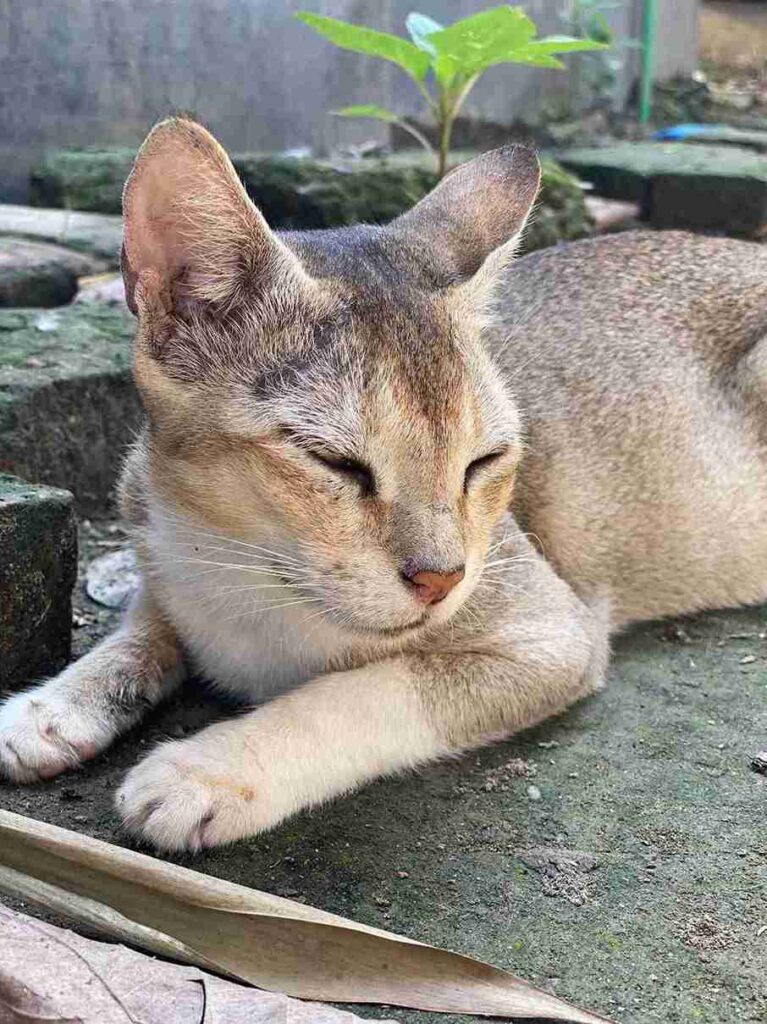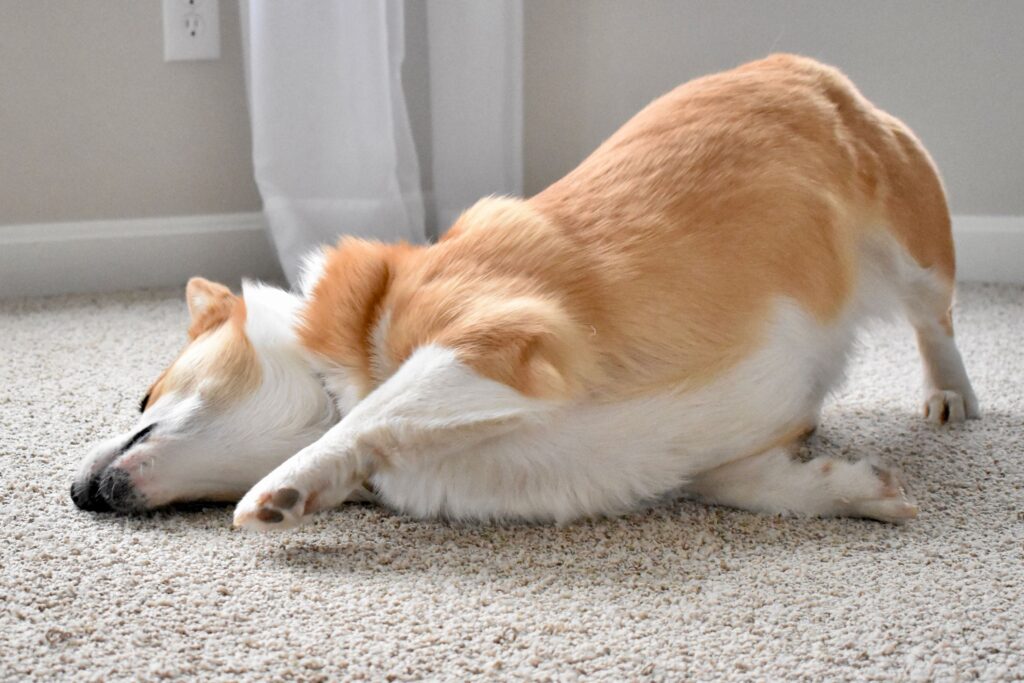When scared, cats can sometimes have a bowel movement as a natural stress response. This behavior is commonly seen in cats and is a normal reaction to fear or anxiety.
In some cases, it may also be a sign of a medical issue. Understanding the possible causes and addressing any underlying problems can help alleviate this issue for your cat.

Credit: www.cnn.com
Contents
- 1 Understanding The Phenomenon
- 2 Physical Causes Of Scared Cat Pooping
- 3 Psychological Causes Of Scared Cat Pooping
- 4 Identifying Signs Of Fear And Anxiety In Cats
- 5 Managing Fear And Anxiety In Cats
- 6 Addressing Medical Factors
- 7 Establishing Healthy Litter Box Habits
- 8 Implementing Behavior Modification Techniques
- 9 Maintaining A Stress-free Environment
- 10 Frequently Asked Questions On My Cat Poops When Scared: What’s Happening?
- 11 Conclusion
Understanding The Phenomenon
Scared cats often express their fear through pooping. This behavior is quite common and can be observed in many felines. There could be several reasons behind this reaction. Firstly, cats have a sensitive nature and are easily frightened. When faced with a fearful situation, their instinct is to react by eliminating waste. This behavior is an involuntary response to cope with intense emotions. Fear can trigger the release of stress hormones, affecting their digestive system and leading to immediate bowel movements.
It is crucial to address this issue as it may cause discomfort and distress to the cat. Regular accidents can be a sign of ongoing anxiety. Understanding the underlying cause of their fear is essential. It could be loud noises, sudden movements, or previous traumatic experiences. By providing a safe and calm environment, cats can feel secure and less prone to extreme reactions. Moreover, it is advisable to consult a veterinarian to rule out any underlying medical conditions that may contribute to their fearful responses.
Physical Causes Of Scared Cat Pooping
A scared cat may experience physical causes that can lead to pooping. One of the reasons is the fight or flight response. When a cat feels threatened or scared, this natural response can trigger bowel movements. Another factor is stimulated bowel movements. Anxiety and fear can stimulate the digestive system, resulting in the need to poop. Additionally, experts have established a link between stress and the digestive system. Stress and anxiety can disrupt normal digestion, causing cats to poop when scared.
Psychological Causes Of Scared Cat Pooping
Psychological causes can play a significant role in a scared cat’s pooping behavior. Traumatic experiences, such as abuse or a frightening encounter, can create anxiety and fear-based reactions in cats. These experiences can trigger a fight-or-flight response, resulting in involuntary bowel movements.
Furthermore, anxiety and fear can have a profound impact on a cat’s litter box habits. Stress can cause changes in a cat’s normal routine, leading to avoidance of the litter box or an increased frequency of pooping outside of it. The fear of being startled or attacked while using the litter box may also contribute to a scared cat’s unwillingness to use it.
It is important to address these psychological causes and provide a safe and comfortable environment for a scared cat to alleviate their anxiety. Creating a peaceful space, offering positive reinforcement, and seeking professional help can all be effective measures in helping a scared cat regain their confidence and overcome their pooping issues.
Identifying Signs Of Fear And Anxiety In Cats
Fear and anxiety in cats can manifest in various ways, and it’s important for pet owners to be able to recognize the signs. Physical indications can include a trembling body, flattened ears, dilated pupils, and a lowered tail. Some cats may also exhibit behavioral changes, such as decreased appetite, excessive grooming, or hiding in unusual places. Paying attention to how your cat behaves in the litter box is also crucial in identifying signs of fear or anxiety. Observing litter box habits can help you understand if your cat is pooping when scared. If you notice your cat pooping outside the litter box or displaying other unusual litter box behaviors, it could be a sign of fear or stress. It’s important to create a safe and comfortable environment for your cat to help alleviate their anxiety.
Managing Fear And Anxiety In Cats
Managing Fear and Anxiety in Cats is essential to ensure their overall well-being and minimize unwanted behaviors such as pooping when scared. One effective approach is creating safe spaces for cats within the home. These safe spaces should be quiet, comfortable areas where cats can retreat to when they feel threatened or overwhelmed.
Gradual desensitization techniques can also be helpful in reducing a cat’s fear response. This involves exposing the cat to the trigger of their fear in a controlled and gradual manner, allowing them to acclimate over time. For example, if loud noises make your cat anxious, you can gradually increase the volume of the sound in a controlled environment, while providing positive reinforcement.
In addition to that, maintaining a calm and consistent environment is crucial for cats. Cats thrive on routine, so establishing a consistent daily schedule for feeding, playtime, and sleep can help reduce their anxiety levels. Minimizing abrupt changes and providing a stable and predictable environment can go a long way in alleviating fear and anxiety in cats.
By implementing these strategies, you can help your cat feel more secure and reduce their tendency to poop when scared. Remember, each cat is unique, and it’s important to tailor your approach to their individual needs and preferences.
Addressing Medical Factors
Consulting with a veterinarian: If your cat is pooping when scared, it’s important to consult with a veterinarian to rule out any underlying medical conditions. They will be able to conduct a thorough examination and possibly recommend further diagnostic tests.
Potential underlying health issues: There are several potential health issues that could be causing your cat to poop when scared. These may include gastrointestinal problems, urinary tract infections, inflammation of the anal glands, or even parasites. A veterinarian will be able to determine the specific issue through proper examination and testing.
The role of medication in managing fear and anxiety: In some cases, medication may be prescribed to help manage fear and anxiety in cats. This can help to reduce the occurrence of pooping when scared. It’s important to work closely with your veterinarian to determine the most appropriate medication and dosage for your cat’s specific needs.
Establishing Healthy Litter Box Habits
In order to establish healthy litter box habits for your cat, it is important to provide a suitable litter box. Choose a litter box that is large enough for your cat to comfortably move around in, and consider whether an open or covered box is more suitable for your cat’s preferences.
Additionally, pay attention to the placement and accessibility of the litter box. It should be located in a quiet, low-traffic area of your home that is easily accessible to your cat. Avoid placing the litter box near loud appliances or in a busy area that may scare your cat.
Regular cleaning and maintenance of the litter box is also essential. Scoop the litter box at least once a day to remove waste and clumps, and completely change the litter and clean the box on a regular basis. This will help ensure that your cat always has a clean and comfortable place to do their business, reducing the likelihood of them getting scared and pooping outside the litter box.
Implementing Behavior Modification Techniques
One effective method of behavior modification for cats who poop when scared is the use of positive reinforcement. This involves rewarding the cat for desired behaviors, such as using the litter box even when feeling fearful. By providing treats, praise, or playtime whenever the cat successfully uses the litter box, they will associate this behavior with positive outcomes and be more likely to repeat it. Another approach is counter-conditioning, which involves gradually exposing the cat to the trigger that causes fear while simultaneously providing positive experiences, such as treats or toys. This helps to change their emotional response and reduce anxiety-associated behaviors like inappropriate defecation. In some cases, it may be necessary to seek professional help from a veterinarian or animal behaviorist who specializes in feline behavior and can provide additional guidance and support.
Maintaining A Stress-free Environment
Minimizing exposure to triggers: Cats can get scared easily, leading to poop accidents. Avoid exposing your cat to triggers that can cause stress or fear. Provide a safe and secure space where your cat can retreat to when feeling scared.
Incorporating play and exercise: Regular play and exercise sessions can help release pent-up energy and reduce anxiety. Engage your cat in interactive play with toys that encourage natural hunting instincts.
Importance of routine and predictability: Create a consistent routine for your cat, including feeding times, play sessions, and litter box cleaning. Predictability helps reduce anxiety and stress for cats.
Ensure a clean and comfortable litter box area: Cats prefer a clean litter box, so clean it regularly to prevent any aversion to the litter box. Provide multiple litter boxes in different areas of your home for convenience.
Use pheromone sprays or diffusers: These products emit synthetic pheromones, creating a calming environment for your cat. Place them in areas where your cat spends most of their time.
Seek veterinary advice: If your cat continues to poop when scared or if you notice any other unusual behaviors, it is essential to consult with a vet. They can determine if there are any underlying health issues contributing to your cat’s behavior.
Frequently Asked Questions On My Cat Poops When Scared: What’s Happening?
What Do Cats Do When They Are Scared?
Cats exhibit various behaviors when scared, including hiding, hissing, running away, arching their backs, and flattening their ears.
Do Cats Stress Poo?
Yes, cats can experience stress, which can sometimes lead to changes in their bowel movements.
How Long Does It Take A Cat To Stop Being Scared?
Cats may take time to stop being scared. It varies depending on their personalities and experiences. Patience, love, and positive reinforcement can help them overcome fear. Allow your cat to approach new things at their own pace to build trust and gradually reduce their fear.
How Do You Comfort A Scared Cat?
To comfort a scared cat, provide a safe and quiet space away from noise and activity. Speak softly to the cat and avoid sudden movements. Offer gentle strokes and calming scents like lavender. Use treats or toys to distract and create positive associations.
Conclusion
To sum up, understanding why your cat poops when scared is crucial for maintaining their overall well-being. By identifying the underlying causes and implementing strategies to reduce fear and anxiety, you can help alleviate this behavior. Remember, patience and consistency are key.
Always consult with your veterinarian for professional advice tailored to your cat’s specific needs. By providing a safe and comfortable environment, you can ensure a happier and healthier life for your feline friend.
Katie Lindsey is a passionate cat lover and founder of Cats Solution, a comprehensive resource for all things feline. With a lifelong love for cats and extensive knowledge in their care and behavior, she provides expert advice and solutions to cat owners. Through her website, Katie fosters a supportive community where cat enthusiasts can find guidance and heartwarming stories. A dedicated advocate for animal welfare, Katie also promotes responsible pet ownership and adoption. Join her on this purr-fect journey celebrating the joy of feline companionship.



